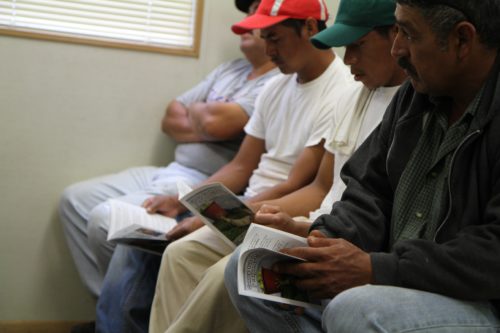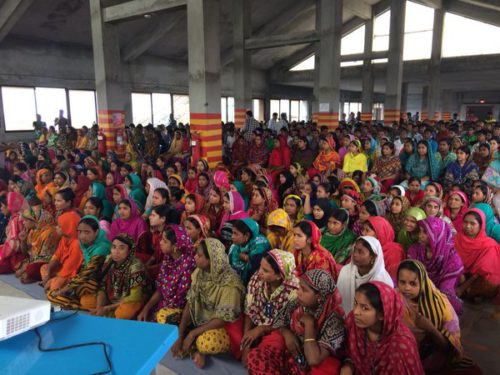In a shrinking world of increasingly globalized markets, low-wage workers at the base of corporate supply chains remain isolated, vulnerable, exploited and abused.

Workers on a Fair Food Program farm receive training on their rights and mechanisms for redress established under the Code of Conduct.
Governments, which should be responsible for protecting the rights of workers, often lack the resources or political will to do so. State-based enforcement agencies and policy frameworks consistently fail to protect workers from dangerous sweatshop conditions and even severe abuses, including forced labor, sexual harassment and rape. Where collective bargaining rights exist and are enforced, unions can provide effective workplace protections. But even when those rights exist in the law, they are ignored in practice for millions of workers, while millions more are excluded from the legal right to form a union altogether.
Corporations bear responsibility for ensuring that human rights are respected in their suppliers’ operations, but they tend to treat the discovery of abuses in their supply chains as public relations crises to be managed, rather than human rights violations to be remedied. Seeking to protect their brands from reputational harm, corporations embrace strategies that profess adherence to fundamental human rights standards but offer no effective mechanisms for enforcing those standards. This approach, known broadly as Corporate Social Responsibility (CSR), is characterized by voluntary commitments, broad standards that mostly mirror local law, ineffective or non-existent monitoring, and the absence of any commitment to or mechanisms for enforcement of the meager standards that do exist. CSR, in effect a form of corporate self-regulation, has failed to address the ongoing human rights crisis in global supply chains in large part because it does not put workers – the very people whose rights are in question and who have the most direct knowledge of the relevant environment – at the center of developing and enforcing solutions to the problem. This failure is evident at all levels of CSR – in its structure, governance, operation and allocation of resources – and it is this fundamental design flaw that makes the failure of these systems inevitable.

The Occupational Safety and Health Committee is introduced to workers at a factory covered by the Accord. Photo Credit: Bangladesh Accord.
In recent years, however, this bleak portrait has begun to change. Both in the US and abroad, workers and their organizations have forged effective solutions that ensure the real, verifiable protection of human rights in corporate supply chains. This new paradigm is known as Worker-driven Social Responsibility (WSR). WSR has been tested in some of the most stubbornly exploitative labor environments in the world today – from the agricultural fields of Florida, which were once dubbed “ground zero for modern-day slavery” by federal prosecutors, to the apparel sweatshops of Bangladesh, the locus of some of this century’s most horrific factory fires and building collapses. In these oppressive environments, WSR has demonstrated its ability to eliminate longstanding abuses and change workers’ lives for the better.
WSR provides a proven new form of power for previously powerless workers to protect and enforce their own rights. These rights can include – according to the circumstances and priorities of the workers driving the program – the right to freedom of association, the right to a safe and healthy work environment (including the right to work free from sexual harassment and sexual violence), and the right to work free of forced labor or violence, among other fundamental rights.
The WSR paradigm is founded on the understanding that, in order to achieve meaningful and lasting improvements, human rights protections in corporate supply chains must be worker-driven, enforcement-focused, and based on legally binding commitments that assign responsibility for improving working conditions to the global corporations at the top of those supply chains. Several essential features distinguish the WSR approach from the failed CSR model. Specifically:
- Worker organizations must be the driving force in the creation, monitoring, and enforcement of programs designed to improve their wages and working conditions;
- Brands and retailers must sign legally binding agreements with worker organizations, and those agreements must require the brands to provide financial support to their suppliers to help meet the labor standards established by the program, and to stop doing business with suppliers who violate those standards;
- Monitoring and enforcement mechanisms must be designed to provide workers an effective voice in the protection of their own rights, including extensive worker education on their rights under the program, rigorous workplace inspections that are effectively independent of brand and retailer influence, public disclosure of the names and locations of participating brands and suppliers, and a complaint mechanism that ensures swift and effective action when workers identify abuses.
Recognition of this new paradigm is increasingly widespread and supporting it is now a moral and functional necessity. Accordingly, a statement of principles has been developed and circulated for endorsement by interested individuals and organizations.
“What is Worker-driven Social Responsibility?” Fact Sheet
White Paper: “What is WSR?” (PDF)
Hoja de Información: ¿Qué es la responsabilidad social dirigida por trabajadores (WSR)?